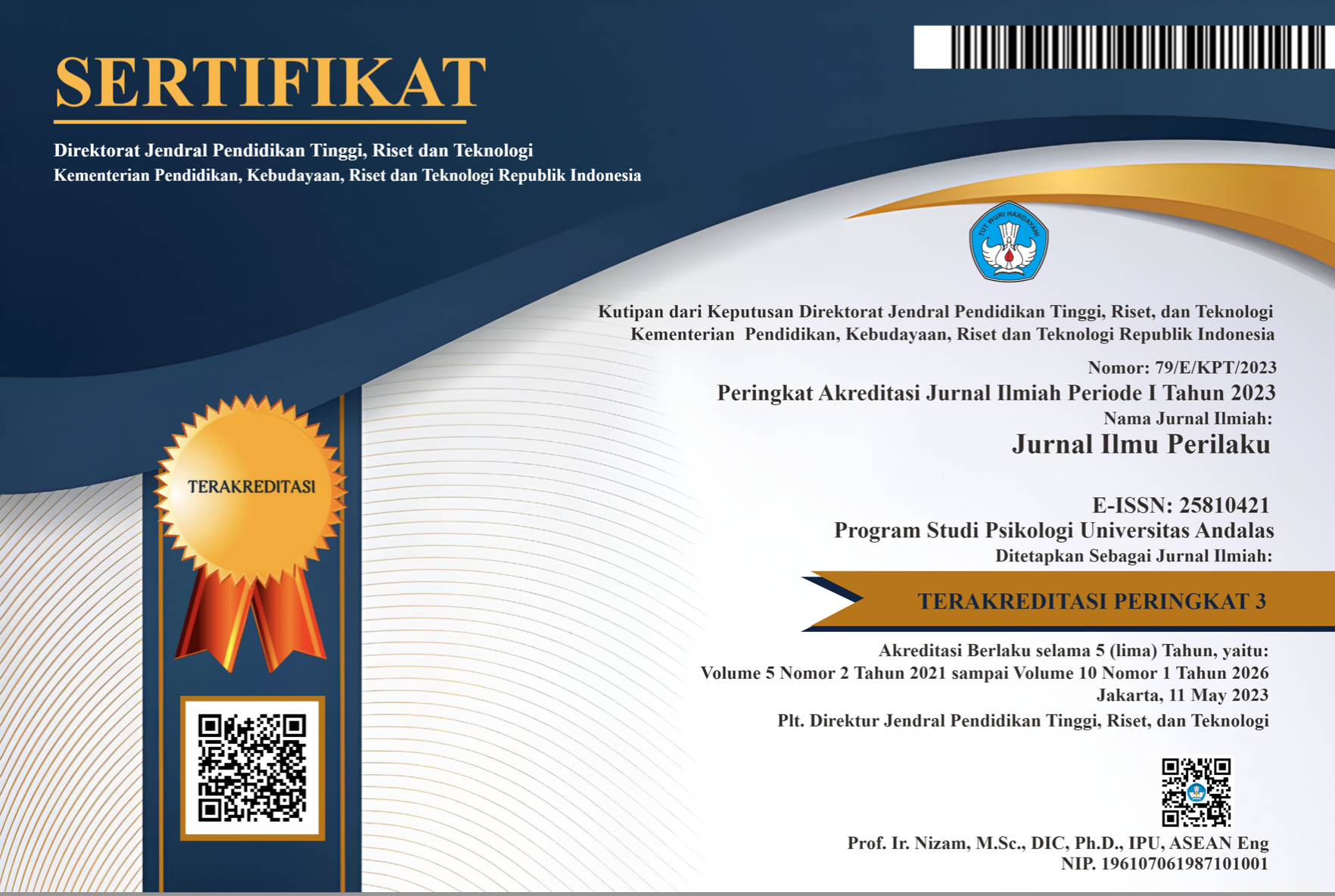Evaluasi Efektivitas Mindfulness Therapy terhadap Smoking Cessation: Studi Meta-Analysis
Abstract
The prevalence of smoking which continues to increase into a problem that to this day has not found a concrete solution certainly requires various tactical and dynamic measures, one of which is through therapeutic mindfulness. This research aims to test the effectiveness of mindfulness therapy against smoking cessation in various groups such as adult men, adolescents, and women. This study used a meta-analysis method that used 12 experimental journals on mindfulness therapy and smoking cessation on an international scale published in English, with a total of 1,017 project participants consisting of 498 experimental subjects and 519 control subjects. Result analysis showed an I2 number of 95.29% which was categorized as random effects due to the heterogeneity of the respondent population in the research that became the references. Hedges analysis g is -0.17 which means mindfulness therapy has little effect on the effectiveness of smoking cessation. Results of the analysis also obtained a signification score of egger's regression at 0.895 which is greater than 0.001 (0.001 < 0.895) which concluded no indication of publication bias. The results of this study concluded that mindfulness therapy had a small effect on smoking cessation. This finding is based on smoking cessation status which is more nicotine addiction and not something that can be assessed cognitively, so additional treatment is needed to make the impact significant.
Keywords: Meta-Analysis, Mindfulness Therapy, Smoking Cessation
Downloads
References
Allen, J. G., Romate, J., & Rajkumar, E. (2021). Mindfulness-based positive psychology interventions: a systematic review. BMC Psychology, 9(1). https://doi.org/10.1186/s40359-021-00618-2
Asfar, T., Koru-Sengul, T., Annane, D., McClure, L. A., Perez, A., Antoni, M. A., Brewer, J., & Lee, D. J. (2021). Reach versus effectiveness: The design and protocol of randomized clinical trial testing a smartphone application versus in-person mindfulness-based smoking cessation intervention among young cancer survivors. Contemporary Clinical Trials Communications, 22. https://doi.org/10.1016/j.conctc.2021.100784
Bowen, S., & Marlatt, A. (2009). Surfing the Urge: Brief Mindfulness-Based Intervention for College Student Smokers. Psychology of Addictive Behaviors, 23(4), 666–671. https://doi.org/10.1037/a0017127
Cambron, C., Hopkins, P., Burningham, C., Lam, C., Cinciripini, P., & Wetter, D. W. (2020). Socioeconomic status, mindfulness, and momentary associations between stress and smoking lapse during a quit attempt. Drug and Alcohol Dependence, 209. https://doi.org/10.1016/j.drugalcdep.2020.107840
Chan, E. Y. (2021). Mindfulness and smoking frequency: An investigation with Australian students. Addictive Behaviors Reports, 13. https://doi.org/10.1016/j.abrep.2021.100342
Chaturvedi, O., & Chaturvedi, P. (2017). Nicotine Gum in Smoking Cessation. In International Journal of Contemporary Medical Research (Vol. 4, Issue 9). www.ijcmr.com
Chin, Samantha. M. (2021). Cigarette smoking patterns, stress, and coping skills: Exploring mindfulness-based meditation for underserved female tobacco smokers with children. http://dx.doi.org/10.34944/dspace/6424
D’Silva, N., Shaikh, A., D’Silva, B., & D’Silva, S. (2022). An empirical study of the use of Chewing Gum by Youth as a replacement to Cigarette addiction. International Journal of Health Sciences, 3083–3096. https://doi.org/10.53730/ijhs.v6ns3.6291
Field, A. P., & Gillett, R. (2010). How to do a meta-analysis. British Journal of Mathematical and Statistical Psychology, 63(3), 665–694. https://doi.org/10.1348/000711010X502733
GATS. (2021). Global Adult Tobacco Survey Fact Sheet Indonesia 2021 - GATS Objectives.
Garrison, K. A., Pal, P., O’Malley, S. S., Pittman, B. P., Gueorguieva, R., Rojiani, R., Scheinost, D., Dallery, J., & Brewer, J. A. (2020). Craving to quit: A randomized controlled trial of smartphone app-based mindfulness training for smoking cessation. Nicotine and Tobacco Research, 22(3), 324–331. https://doi.org/10.1093/ntr/nty126
Heppner, W. L., Spears, C. A., Correa-Fernández, V., Castro, Y., Li, Y., Guo, B., Reitzel, L. R., Vidrine, J. I., Mazas, C. A., Cofta-Woerpel, L., Cinciripini, P. M., Ahluwalia, J. S., & Wetter, D. W. (2016). Dispositional Mindfulness Predicts Enhanced Smoking Cessation and Smoking Lapse Recovery. Annals of Behavioral Medicine, 50(3), 337–347. https://doi.org/10.1007/s12160-015-9759-3
Jackson, S., Brown, J., Norris, E., Livingstone-Banks, J., Hayes, E., & Lindson, N. (2022). Mindfulness for smoking cessation. In Cochrane Database of Systematic Reviews (Vol. 2022, Issue 4). John Wiley and Sons Ltd. https://doi.org/10.1002/14651858.CD013696.pub2
Kragel, E. A., Sweitzer, M. M., & Davis, J. M. (2019). The Effect of Brief Mindfulness Training on Brain Reactivity to Food Cues During Nicotine Withdrawal: A Pilot Functional Imaging Study. Mindfulness, 10(11), 2272–2276. https://doi.org/10.1007/s12671-019-01201-y
Lotfalian, S., Spears, C. A., & Juliano, L. M. (2020). The effects of mindfulness-based yogic breathing on craving, affect, and smoking behavior. Psychology of Addictive Behaviors, 34(2), 351–359. https://doi.org/10.1037/adb0000536
Mengga, C., Pasiak, T., & Tuda, J. (2022). Pengaruh Meditasi Kesadaran (Mindfulness Meditation) dengan Metode Pendekatan Cognitive Trancendence Strategies terhadap Perubahan Perilaku Merokok. Jurnal Biomedik:JBM, 14(1), 30. https://doi.org/10.35790/jbm.v14i1.37283
Mhende, J., Bell, S. A., Cottrell-Daniels, C., Luong, J., Streiff, M., Dannenfelser, M., Hayat, M. J., & Spears, C. A. (2021). Mobile delivery of mindfulness-based smoking cessation treatment among low-income adults during the COVID-19 pandemic: Pilot randomized controlled trial. JMIR Formative Research, 5(7). https://doi.org/10.2196/25926
Moulton-Perkins, & Strauss, A. (2022). Systematic review of mindfulness¬based cognitive therapy and mindfulness¬based stress reduction via group videoconferencing: feasibility, acceptability, safety, and efficacy. Journal of Psychotherapy Integration, 32(1), 110–130. http://sro.sussex.ac.uk
Oikonomou, M. T., Arvanitis, M., & Sokolove, R. L. (2017). Mindfulness training for smoking cessation: A meta-analysis of randomized-controlled trials. Journal of Health Psychology, 22(14), 1841–1850. https://doi.org/10.1177/1359105316637667
Page, M. J., McKenzie, J. E., Bossuyt, P. M., Boutron, I., Hoffmann, T. C., Mulrow, C. D., Shamseer, L., Tetzlaff, J. M., Akl, E. A., Brennan, S. E., Chou, R., Glanville, J., Grimshaw, J. M., Hróbjartsson, A., Lalu, M. M., Li, T., Loder, E. W., Mayo-Wilson, E., McDonald, S., … Moher, D. (2021). The PRISMA 2020 statement: An updated guideline for reporting systematic reviews. In The BMJ (Vol. 372). BMJ Publishing Group. https://doi.org/10.1136/bmj.n71
Pbert, L., Druker, S., Crawford, S., Frisard, C., Trivedi, M., Osganian, S. K., & Brewer, J. (2020). Feasibility of a Smartphone App with Mindfulness Training for Adolescent Smoking Cessation: Craving to Quit (C2Q)-Teen. Mindfulness, 11(3), 720–733. https://doi.org/10.1007/s12671-019-01273-w
Piper, M. E., Bullen, C., Krishnan-Sarin, S., Rigotti, N. A., Steinberg, M. L., Streck, J. M., & Joseph, A. M. (2020). Defining and Measuring Abstinence in Clinical Trials of Smoking Cessation Interventions: An Updated Review. In Nicotine and Tobacco Research (Vol. 22, Issue 7, pp. 1098–1106). Oxford University Press. https://doi.org/10.1093/ntr/ntz110
Potvin, S., Tik�sz, A., Dinh-Williams, L. L. A., Bourque, J., & Mendrek, A. (2015). Cigarette cravings, impulsivity, and the brain. In Frontiers in Psychiatry (Vol. 6, Issue SEP). Frontiers Media S.A. https://doi.org/10.3389/fpsyt.2015.00125
Retnawari, H., Apino, E., Djidu, H., Kartianom, & Anazifa, R. (2018). Pengantar Analisis Meta (1st Edition). Parama Publishing. https://www.researchgate.net/publication/334644017
Roos, C. R., Brewer, J. A., O’Malley, S. S., & Garrison, K. A. (2019). Baseline Craving Strength as a Prognostic Marker of Benefit from Smartphone App-Based Mindfulness Training for Smoking Cessation. Mindfulness, 10(10), 2165–2171. https://doi.org/10.1007/s12671-019-01188-6
Ruscio, A. C., Muench, C., Brede, E., & Waters, A. J. (2016). Effect of brief mindfulness practice on self-reported affect, craving, and smoking: A pilot randomized controlled trial using ecological momentary assessment. Nicotine and Tobacco Research, 18(1), 64–73. https://doi.org/10.1093/ntr/ntv074
Santoso, A. (2010). Studi deskriptif effect size penelitian-penelitian di fakultas psikologi Universitas Sanata Dharma. Jurnal Penelitian Universitas Sanata Dharma, 14(1), 1–17.
Spears, C. A., Mhende, J., Hawkins, C., Do, V. Van, Hayat, M. J., Eriksen, M. P., Hedeker, D., Abroms, L. C., & Wetter, D. W. (2022). Mindfulness-Based Smoking Cessation Delivered Through Telehealth and Text Messaging for Low-Income Smokers: Protocol for a Randomized Controlled Trial. JMIR Research Protocols, 11(8). https://doi.org/10.2196/35688
Tang, Y. Y., Tang, R., & Posner, M. I. (2013). Brief meditation training induces smoking reduction. Proceedings of the National Academy of Sciences of the United States of America, 110(34), 13971–13975. https://doi.org/10.1073/pnas.1311887110
Taylor, V. A., Smith, R., & Brewer, J. A. (2022). App-Based Mindfulness Training Predicts Reductions in Smoking Behavior by Engaging Reinforcement Learning Mechanisms: A Preliminary Naturalistic Single-Arm Study. Sensors, 22(14). https://doi.org/10.3390/s22145131
Vidrine, J. I., Spears, C. A., Heppner, W. L., Reitzel, L. R., Marcus, M. T., Cinciripini, P. M., Waters, A. J., Li, Y., Nguyen, N. T. T., Cao, Y., Tindle, H. A., Fine, M., Safranek, L. V., & Wetter, D. W. (2016). Efficacy of mindfulness-based addiction treatment (MBAT) for smoking cessation and lapse recovery: A randomized clinical trial. Journal of Consulting and Clinical Psychology, 84(9), 824–838. https://doi.org/10.1037/ccp0000117
WHO global report on trends in prevalence of tobacco use 2000-2025 Fourth edition WHO global report on trends in prevalence of tobacco use 2000-2025, fourth edition ISBN 978-92-4-003932-2 (electronic version). (2021). http://apps.who.int/bookorders.
Wiradhany, W., Adiasto, K., Yulianto, J. E., & Kiling, I. Y. (2019). Pemahaman Peneliti Psikologi mengenai Besaran Sampel: Data dan Simulasi. Jurnal Psikologi, 46(2), 163. https://doi.org/10.22146/jpsi.24260
The non-commercial use of the article is governed by the Creative Commons Attribution license as currently displayed on Creative Commons Attribution-NonCommercial-ShareAlike 4.0 International License.
JIP's spirit is to disseminate articles published are as free as possible. Under the Creative Commons license, JIP permits users to copy, distribute, display, and perform the work for non-commercial purposes only. Users will also need to attribute authors and JIP on distributing works in the journal.
Please find the rights and licenses in Jurnal Ilmu Perilaku (JIP).
- License
The non-commercial use of the article will be governed by the Creative Commons Attribution license as currently displayed on Creative Commons Attribution-NonCommercial-ShareAlike 4.0 International License.
- Author’s Warranties
The author warrants that the article is original, written by stated author(s), has not been published before, contains no unlawful statements, does not infringe the rights of others, is subject to copyright that is vested exclusively in the author and free of any third party rights, and that any necessary written permissions to quote from other sources have been obtained by the author(s).
- User Rights
JIP's spirit is to disseminate articles published are as free as possible. Under the Creative Commons license, JIP permits users to copy, distribute, display, and perform the work for non-commercial purposes only. Users will also need to attribute authors and JIP on distributing works in the journal.
- Rights of Authors
Authors retain the following rights:
- Copyright, and other proprietary rights relating to the article, such as patent rights,
- The right to use the substance of the article in future own works, including lectures and books,
- The right to reproduce the article for own purposes, provided the copies are not offered for sale,
- The right to self-archive the article.
- Co-Authorship
If the article was jointly prepared by other authors, the signatory of this form warrants that he/she has been authorized by all co-authors to sign this agreement on their behalf, and agrees to inform his/her co-authors of the terms of this agreement.
- Termination
This agreement can be terminated by the author or JIP upon two months’ notice where the other party has materially breached this agreement and failed to remedy such breach within a month of being given the terminating party’s notice requesting such breach to be remedied. No breach or violation of this agreement will cause this agreement or any license granted in it to terminate automatically or affect the definition of JIP.
- Royalties
This agreement entitles the author to no royalties or other fees. To such extent as legally permissible, the author waives his or her right to collect royalties relative to the article in respect of any use of the article by JIP or its sublicensee.
- Miscellaneous
JIP will publish the article (or have it published) in the journal if the article’s editorial process is successfully completed and JIP or its sublicensee has become obligated to have the article published. JIP may conform the article to a style of punctuation, spelling, capitalization, referencing and usage that it deems appropriate. The author acknowledges that the article may be published so that it will be publicly accessible and such access will be free of charge for the readers.










